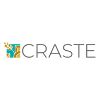
 Craste
CrasteOver the next few years and decades, India is likely to see a strong bio-economy emerge and flourish in many parts of the country.
While bio-economy currently mostly brings to mind biofuels and bio-energy, the emerging bio-economy sector will comprise sectors such as bio-based plastics, bio-based packaging materials, bio-based chemicals and further on, bio-based pharmaceuticals and nutraceuticals. While some of these categories have existed for long (bio-based pharma, chemicals, nutra etc), one can expect a much larger portfolio of these categories of products to be made from bio-based sources in future.
The large availability of agricultural waste in India - up to 350 million tons per annum per some estimates - has been a key motivator for many startups to explore avenues to extract & recover value from this asset. While many of the bio-economy possibilities listed above are technically feasible from agricultural waste, the economic viability for many of them are still not quite favourable.
Startups such as Craste, with agricultural waste as the feedstock, have smartly focussed on making products that have a much higher economic viability right away - products such as paper, packaging materials, furniture and particle boards. Their approach of not using chemicals such as formaldehyde during the making of products such as particle boards enhances the sustainability credentials for products from such startups, and consequently increases the total market available.
Team EAI wishes Craste the very best!
 Keywords
Keywords.png) Website
Website